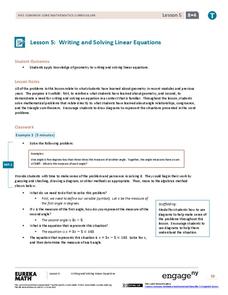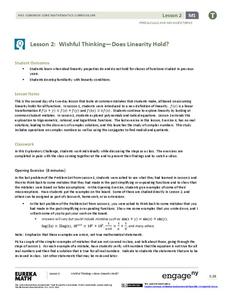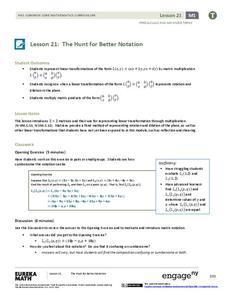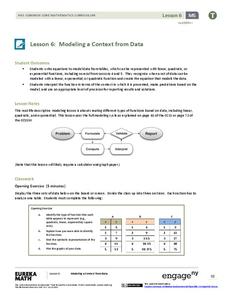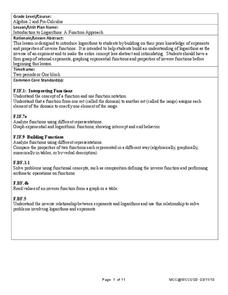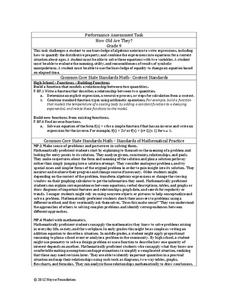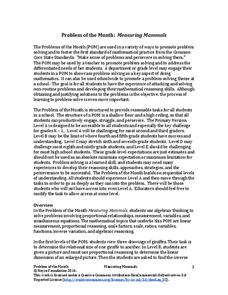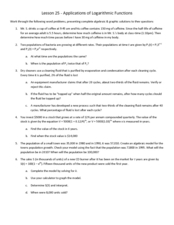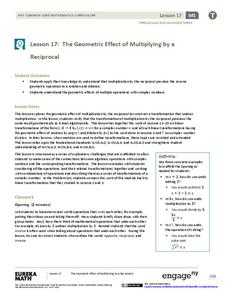EngageNY
Writing and Solving Linear Equations
Incorporate geometry into the solving linear equations lesson. Pupils use their knowledge of geometry to write linear equations which reinforces geometry measurement concepts while at the same time providing a familiar context for...
EngageNY
Wishful Thinking—Does Linearity Hold? (Part 2)
Trying to find a linear transformation is like finding a needle in a haystack. The second lesson in the series of 32 continues to explore the concept of linearity started in the first lesson. The class explores trigonometric, rational,...
EngageNY
The Hunt for Better Notation
The matrix — it's not just a movie. The lesson introduces the concept of 2 x 2 matrix multiplication as a way to represent linear transformations. Class members determine when a linear transformation represented as matrix...
EngageNY
True and False Number Sentences
True or false? Scholars determine the truth value of equations and inequalities through substitution. All values to use for substitution are given with each equation or inequality. This is the 24th lesson in a module of 36.
Flipped Math
Calculus AB/BC Mid-Unit 1 Review: Limits
Limit the amount one forgets about limits. A mid-unit review lesson has individuals complete a worksheet of problems on limits. They go over the meaning of limits, evaluate limits algebraically, use graphs and tables to find limits, and...
EngageNY
Analyzing Residuals (Part 1)
Just how far off is the least squares line? Using a graphing calculator, individuals or pairs create residual plots in order to determine how well a best fit line models data. Three examples walk through the calculator procedure of...
EngageNY
Modeling a Context from Data (part 1)
While creating models from data, pupils make decisions about precision. Exercises are provided that require linear, quadratic, or exponential models based upon the desired precision.
Houghton Mifflin Harcourt
Write and Evaluate Algebraic Expressions
Once your math class is adept at writing expressions, challenge them with a few word problems! There are six real-world scenarios for which learners must come up with a representative variable expression. Take CCSS.Math.Content.6.EE.2.a...
EngageNY
Justifying the Geometric Effect of Complex Multiplication
The 14th lesson in the unit has the class prove the nine general cases of the geometric representation of complex number multiplication. Class members determine the modulus of the product and hypothesize the relationship for the...
EngageNY
Lines That Pass Through Regions
Good things happen when algebra and geometry get together! Continue the exploration of coordinate geometry in the third lesson plan in the series. Pupils explore linear equations and describe the points of intersection with a given...
Curated OER
Fundamental Theorem of Algebra
For this worksheet, learners identify the Fundamental Theorem of Algebra. They solve polynomial functions and simplify expressions and equations.
Curated OER
Solving Inequalities
This is a nice learning exercise on solving one variable and compound inequalities. Learners solve inequalities and graph the solution on a number line. The two page learning exercise contains explanation and sixteen practice...
West Contra Costa Unified School District
Polynomial Division
How do you apply the traditional division algorithm to polynomials? Here is an Algebra II lesson that extends the use of the division algorithm to polynomials. After establishing the concept of long division, synthetic division and the...
West Contra Costa Unified School District
Connecting Graphing and Solving Absolute Value Equations and Functions
Can you solve an equation graphically? Absolutely! This Algebra II lesson makes the connection between solving an absolute value equation and graphing two functions. Graphing absolute value functions is presented through the process of...
West Contra Costa Unified School District
Introduction to Logarithms
Build on pupils' understanding of inverse functions by connecting logarithmic functions to exponential functions. This activity allows individuals to see graphically the inverse relationship between an exponential and logarithmic...
Inside Mathematics
How Old Are They?
Here is a (great) lesson on using parentheses! The task requires the expression of ages using algebraic expressions, including the distributive property. Pupils use their expressions to determine the individual ages.
Noyce Foundation
Digging Dinosaurs
Build a function to solve problems rooted in archeology. A comprehensive set of five lessons presents problems requiring individuals to use functions. The initial lesson asks learners to find the possible number of dinosaurs from a...
Noyce Foundation
Measuring Mammals
Explore the meaning of scale and proportion with a set of five activities that examines the topic from elementary through high school. The first lessons explore ratio by examining pictures of different sizes. The next three activities...
Virginia Department of Education
Balanced
Bring balance to your lesson plans with an activity that asks individuals to solve one-step linear equations with inverse operations. Balance scales help learners understand the concept of isolating the variable.
Curated OER
Lesson 25 - Applications of Logarithmic Functions
in this applications of logarithmic functions worksheet, students solve 11 short answer problems. Students use logarithms to find half lives, compound interest, and population growth given a word problem.
West Contra Costa Unified School District
Discovering Zero and Negative Exponents
Need a hand with an Algebra II integer exponent instructional activity? This versatile worksheet can be utilized as a instructional activity to supplement instruction. It derives the idea of a negative exponent before practicing a...
Federal Reserve Bank
Retirement Planning
It's never too early to start saving for retirement. In fact, the earlier one starts, the better! Use this retirement planning activity to teach the importance of a retirement strategy and why to start at a young age.
West Contra Costa Unified School District
Matching Quadratic Functions
Ever sigh when learners ask why they have to know so many different forms of the quadratic equation? Here is a lesson that comes in handy! Using hands-on matching activities, quadratic equations are explored through...
EngageNY
The Geometric Effect of Multiplying by a Reciprocal
Class members perform complex operations on a plane in the 17th segment in the 32-part series. Learners first verify that multiplication by the reciprocal does the same geometrically as it does algebraically. The class then circles back...


